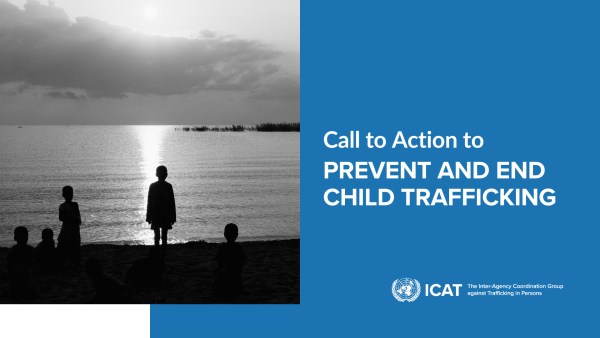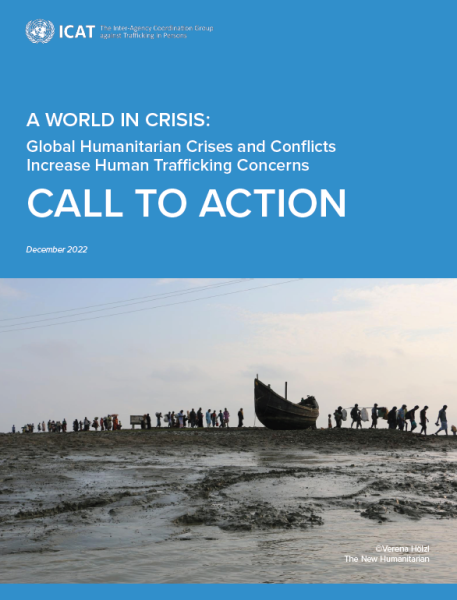Chairs' Annual Report 2023
This Annual Report presents key highlights of the work undertaken by the Inter-Agency Coordination Group against Trafficking in Persons (ICAT) in 2023 under the co-chairpersonship of the International Organization for Migration (IOM) and the Office of the Special Representative of the Secretary-General on Violence against Children (OSRSG-VAC).
Child-friendly version: ICAT Call for Accelerated Action by 2025 to Prevent and End Child Trafficking
Child trafficking is one of the worst forms of violence against children, and a serious crime. Globally, at least one third of identified victims of trafficking are children. Urgent action is, therefore, required to end this crime. In 2023, the Inter-Agency Coordination Group against Trafficking in Persons (ICAT) released a Call to Action urging States and all relevant stakeholders to upscale efforts to end child trafficking. This publication is a child-friendly version of the 2023 Call to Action.
Sustainable Finance and Trafficking in Persons
The financial sector plays a crucial role in countering trafficking in persons. Investors’ attention on human rights has increased over the years. It is integral that financial sector actors do not only ensure that they are not causing, contributing or directly linked to human trafficking by business relationships, but that they proactively contribute to a higher standard of living for groups at heightened risk of vulnerability, which would contribute to vulnerability reduction and reduce the risk of (re)trafficking. This Issue Paper discusses how sustainable finance can be harnessed to prevent and address trafficking. It further provides recommendations on how to leverage sustainable finance to counter human trafficking.
ICAT Calls for Accelerated Action by 2025 to Prevent and End Child Trafficking (Edited version)
Child trafficking is one of the worst forms of violence against children, and a serious global concern that requires urgent response. On 8 November 2023, the Principals of Inter-Agency Coordination Group against Trafficking in Persons (ICAT) released a Call to Action persuading States, businesses, and financial sectors, to consolidate their efforts in countering child trafficking with child protection as a top priority.
Joint Statement of the Inter-Agency Coordination Group against Trafficking in Persons (ICAT) on the World Day against Trafficking in Persons, 2023
On the occasion of the World Day against Trafficking in Persons 2023, the Inter-Agency Coordination Group against Trafficking in Persons (ICAT) calls on all States and other duty bearers to act immediately to strengthen measures addressing vulnerability to trafficking in persons, ensure effective prosecution of perpetrators and of those who benefit from exploitation, as well as improve access of trafficked persons to protection and support that is human rights-based, trauma-informed, and gender-, age-, and disability-sensitive, so that no one – trafficked or at risk – is left behind, and ensure meaningful and ethical inclusion of survivors’ voices and perspectives.
Chairs' Annual Report 2022
This Annual Report presents the highlights of the work undertaken by the Inter-Agency Coordination Group against Trafficking in Persons (ICAT) under the co-chairpersonship of the United Nations Office on Drugs and Crime (UNODC) and the International Centre for Migration Policy Development (ICMPD) in 2022, a year plagued by multiple crises including climate change-induced disasters, the lingering COVID-19 pandemic, global economic and food insecurity, forced displacement and conflicts.
ICAT calls for stronger action and cooperation to counter human trafficking in humanitarian crises and conflicts
With the world currently experiencing multiple crises with serious humanitarian consequences, the Heads of the Inter-Agency Coordination Group against Trafficking in Persons (ICAT) agencies have released a Call to Action urging States, humanitarian actors and other relevant stakeholders to strengthen efforts and cooperation to prevent and combat human trafficking in humanitarian crises and conflict situations.
ICAT calls for leveraging technology to end trafficking in persons
On the occasion of the World Day against Trafficking in Persons, 2022, the Inter-Agency Coordination Group against Trafficking in Persons (ICAT) calls upon all States, in cooperation with relevant stakeholders including the private sector, to harness the immense potential that technology offers in countering trafficking in persons.
Issue Brief 12 - Addressing vulnerability to trafficking in persons
Evidence collected in the past decades clearly illustrates that there are a variety of factors that intersect to enhance the vulnerability of certain individuals and their risks of being targeted and recruited by traffickers. This ICAT brief sheds light on the concept of vulnerability and the different dimensions and factors that make a person vulnerable to trafficking in persons, while providing recommendations to relevant stakeholders in addressing those factors and mitigating the related risks.
Chairs' Annual Report 2021
The 2021 ICAT Chairs’ Annual Report presents key milestones for ICAT in 2021 under its UNHCR and UNODC co-chairpersonship, including stronger engagement of victims and survivors of trafficking; the promotion of sustainable procurement to mitigate risks of trafficking in global supply chains, including in the UN´s own procurement practices; the development and implementation of an outreach strategy to country-level stakeholders; and multi-agency inputs and support to UN processes such as the quadrennial appraisal of the UN General Assembly’s Global Plan of Action to Combat Trafficking in Persons.









